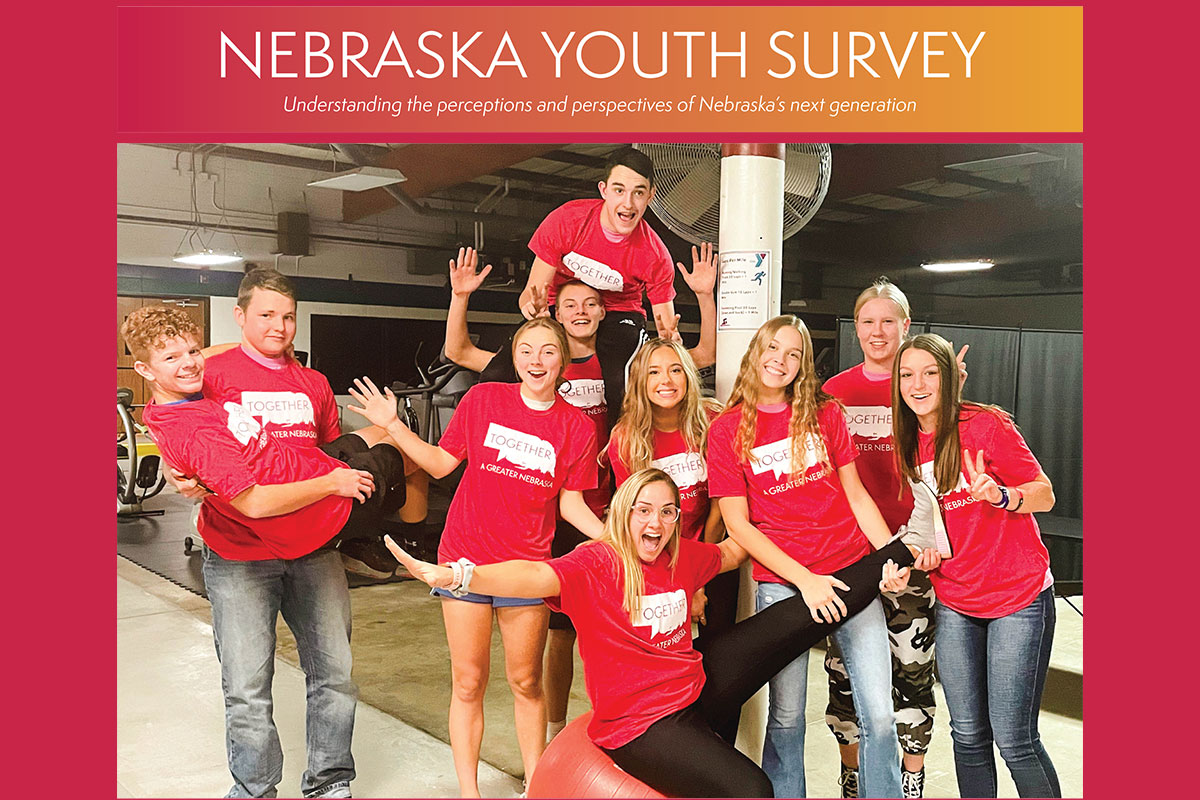2022 Nebraska Youth Survey Results Indicate Preference for Small Communities
Greater Nebraska youth remain committed to small communities but there is work to be done in showing them they can have the future they want in their hometowns, according to the Nebraska Community Foundation’s recently released 2022 Nebraska Youth Survey.
- published: 2022/09/12
- contact: Josie Schafer - Center for Public Affairs Research
- email: jgschafer@unomaha.edu

The Nebraska Community Foundation (NCF), in partnership with the University of Nebraska at Omaha's Center for Public Affairs Research (CPAR) and local school districts, surveyed 715 middle and high school students between January and May of 2022. Participating communities included Bertrand, Butler County, Columbus, Howells, and Stuart.
Read the 2022 Nebraska Youth Survey Executive Summary
Building on a trend from previous surveys, respondents expressed a strong preference for small communities. Only 4% said they would like to live in a community larger than any in Nebraska. Safety, good schools, and proximity to family continue to be the top characteristics of their ideal community, and the vast majority (71%) said there is no stigma associated with returning to your hometown as an adult.
Though Nebraska youth seem to not see social downsides to returning home, results suggest they are susceptible to misperceptions about a lack of career or professional upsides to living in Greater Nebraska.
Healthcare (22%), agriculture (14%), and education (8%) represented the top three most desirable industries among respondents, but there seems to be a disconnect between what they want to do and what they perceive to be available where they live. Of student respondents, 48% said if they were to not live in their community as an adult the main reason would be job or business opportunities elsewhere.
Industries that are hiring the most are industries Greater Nebraska youth have shown interest in, including healthcare, education, and recreation."
“Many of the industries students are pursuing have job openings in their communities,” said Josie Gatti Schafer, Ph.D., director of CPAR. “And industries that are hiring the most are industries Greater Nebraska youth have shown interest in, including healthcare, education, and recreation. Opportunities like internships are a great way to help students on their career path and ensure they understand the potential in their own communities.”
This year’s respondents included 149 students of color, or 24% of the sample. Students of all ethnic and racial backgrounds said they value “diverse cultural experiences” and were likely to take a stand against “unfair treatment” – but the survey found notable differences among the experiences of non-white students. They reported feeling less connected to the places they live and are less likely to live there in the future.
Compared to white students, students of color were more likely to plan to work directly after high school, they wanted more organizations to engage within their community, and were less likely to want to live in the area they live now as an adult. In addition, they reported seeing unfair treatment at slightly higher rates than the white peers.
“With diversity increasing, outreach and inclusion are critical to population sustainability and growth in Greater Nebraska,” Schafer said. “The variation in response across demographic groups suggests some work is to be done to ensure inclusion and that everyone feels connected to their hometown.”
The results of the Youth Survey begin to reveal the priorities, values, concerns, and desires of these individuals as well as factors that may influence their decision to return to or remain in Greater Nebraska in the future. The hope is that these data may serve as a resource for NCF’s network of 1,500 community volunteers as well as other organizations and entities that share an interest in people attraction.
“Nebraska Community Foundation’s network of affiliated funds and volunteers across the state are committed to keeping their communities thriving, magnetic places,” said Jeff Yost, president and CEO of NCF. “The future of our hometowns depends on young Nebraskans returning to or remaining in our communities. Youth surveys are just one of the tools in our people attraction toolbelt. It is imperative that we listen to what they have to say.”
Pure Nebraska aired a piece featuring the voices of Greater Nebraska high schoolers in Howells, Diller, Taylor, and Leigh, followed by an interview with NCF COO K.C. Belitz.
For more information on the 2022 Nebraska Youth Survey or to request a copy of the full report, visit www.NebraskaHometown.org.
NCF and CPAR have partnered to conduct the Nebraska Youth Survey in 2020 and 2021.
About The Center for Public Affairs Research
The Center for Public Affairs Research collaboratively produces and disseminates high-quality public scholarship about topics that impact the lives of Nebraskans. Ongoing projects from CPAR, include policy analyses for the Planning Committee of the Nebraska State Legislature, the Nebraska Rural Transit Project, governing.unomaha.edu, and designation by the U.S. Census Bureau as a statewide liaison for disseminating a range of data products. To learn more about CPAR and access many of our data resources go to cpar.unomaha.edu.